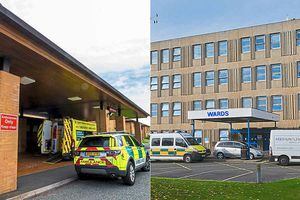Number of 'bed blockers' at Shropshire's hospitals falls
The number of beds a week taken up by people who are fit to leave the county's two main hospitals fell last month, new figures have revealed.

So called "bed blocking" at Royal Shrewsbury Hospital and Princess Royal Hospital in Telford has averaged more than 90 patients a week for the past 12 months.
However, the latest figures show a reduction in numbers, with January seeing 314 patients medically fit for transfer over the month – translating to 1,569 "lost bed days".
This is in comparison to December which saw 394 patients medically fit for transfer over the month – translating to 2,326 lost bed days.
In its most recent report The Shrewsbury and Telford Hospital NHS Trust said the current year to date fit for transfer lost bed days are 22,698 against 19,855 for the same time last year. This is a change of 14.3 per cent.
Some of the reasons for the delays in transfers are that there are no available beds in the community, or because it takes time to arrange for carers.
The trust said the increase in both the time people are waiting to leave hospital and the number of people waiting also has a knock-on effect on the time people spend waiting in A&E.
Dr Kevin Eardley, care group medical director for unscheduled care at The Shrewsbury and Telford Hospital NHS Trust, said: "Having large numbers of patients in our hospitals who no longer need the specialised care we provide creates a number of issues.
"It can prevent us from getting the sickest patients into the right specialist beds in a timely manner. This can lead to a lengthier stay in hospital and an increase in the time it takes for them to be seen by the right consultant.
"If a patient is delayed in being discharged from hospital, it puts them at greater risk of further deterioration and of contracting an infection.
"Many of the patients we see are frail or elderly, and prolonged stays in hospital can lead to increased risk of falls through muscle weakness; increased confusion or disorientation; and further immobility due to inactivity.
"It also creates problems for acutely ill patients, who can become delayed in assessment areas or in our Emergency Departments whilst waiting for beds to become available, which can lead to longer waits in our A&Es for all patients."
Last month Councillor Lee Chapman, Shropshire Council's cabinet member for adult services, said the authority is committed to investing in adult social care, despite a continuous reduction in both local government and health funding.
He said work is ongoing with the council, local hospitals, Shropshire Clinical Commissioning Group and voluntary organisations to try to tackle the problem of bed blocking.





